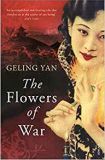The Flowers of War by Geling Yan and Nicky Harman (translator)
| The Flowers of War by Geling Yan and Nicky Harman (translator) | |
|
| |
| Category: Historical Fiction | |
| Reviewer: Robin Stevens | |
| Summary: An account of the horrors of the 1937 Japanese invasion of Nanking, the surface simplicity of this book masks a powerful exploration of the bravery of human beings faced with an intolerable situation. | |
| Buy? Yes | Borrow? Yes |
| Pages: 256 | Date: January 2013 |
| Publisher: Vintage | |
| ISBN: 9780099569626 | |
|
| |
1937, Nanking. The war between the Republic of China and Japan has ended in defeat for China, and now Japanese soldiers are moving in to bloodily occupy the capital city. In a small American mission church, fifteen Chinese schoolgirls are hiding, trapped until the priests who look after them can smuggle them to safety. Into this already fraught atmosphere come desperate Chinese citizens looking for shelter – a rowdy group of Nanking prostitutes, a colonel on the run and two more soldiers who have survived a horrendous secret massacre. As the Japanese atrocities gather pace, the safety and survival of each of the church’s disparate members becomes uncertain, and the initially hostile girls begin to realise that there may be common ground between them and the prostitutes they have been taught to despise.
The premise of The Flowers of War is simple, and it’s written in prose to match. It’s a cool, understated response to one of the worst horrors in recent Chinese history, a vast tragedy tackled on a deliberately minimalist scale. Yan makes tiny details immensely evocative – there’s meaning in the slant of a shoulder or the flick of a sleeve. In writing that is spare and vivid and with a plot that rarely moves outside the claustrophobic walls of the mission compound, she sets out a psychological problem terrible in its simplicity. How do you come to terms with the fact that you won’t live to see another day, and, as you face death, can you still be capable of making decisions about your own destiny?
The Flowers of War is distressingly powerful, but all the same it’s a book that I didn’t warm to initially. It is such a stark, stripped-down piece of writing, its characters at times seeming reduced almost to characteristics. Nicky Harman’s translation from the original Mandarin is good, the words themselves elegantly rendered, but all the same there’s something at the heart of The Flowers of War that’s almost untranslatable, and that’s the emotional impact of the story itself.
As a European who grew up in the 1990s I know about the Nanking invasion, but not as an event that’s part of my cultural history. It hasn’t been burnt into me over years of my life the way that, say, the Nazi atrocities have, and so, in coming to its horrors fresh, I can’t possibly replicate the weary, repulsed recognition that Yan obviously intends her readers to experience. The Nanking massacre is a moment that looms as painfully large in the Chinese culture as Auschwitz does in the European. It’s the event that’s the lead of Yan’s story, but the event itself is directly present only in sporadic bursts.
In setting her story in the American church, Yan is trying to evoke the eye of the storm, a place of unearthly peace surrounded by atrocities so etched into the Chinese cultural consciousness that she barely has a need to describe them. And, apart from a harrowing description of the Japanese mass-murder of Chinese soldiers, many of the foulest events occur off-page, reaching the ears of the characters through vague reports or half-suppressed accounts. It’s a grim, chilling shorthand, and one to which I’m not sure that I have the full key.
The Flowers of War is an inward-looking text that assumes that the reader must know with every fibre of their being what is going on outside its small space, and by extension what’s at stake for the people inside the bubble. Not all readers will. Nevertheless, this is still a necessary read regardless of background, an astonishing account of human beings forced to tolerate the intolerable aftermath of war.
At times I was very disturbed by The Flowers of War, and I’m still not sure that I’ve fully understood or come to terms with its conclusion. I think, though, that its tenacious hold over my imagination in the days since I’ve finished it is a testament to how deeply it affected me. This is a book that deserves to be read, and struggled with, and praised.
For more brave Chinese women, read Message from an Unknown Chinese Mother: Stories of Loss and Love by Xinran
Please share on: ![]() Facebook,
Facebook, ![]() Twitter and
Twitter and
![]() Instagram
Instagram
![]() You can read more book reviews or buy The Flowers of War by Geling Yan and Nicky Harman (translator) at Amazon.co.uk Amazon currently charges £2.99 for standard delivery for orders under £20, over which delivery is free. (Paid link)
You can read more book reviews or buy The Flowers of War by Geling Yan and Nicky Harman (translator) at Amazon.co.uk Amazon currently charges £2.99 for standard delivery for orders under £20, over which delivery is free. (Paid link)
![]() You can read more book reviews or buy The Flowers of War by Geling Yan and Nicky Harman (translator) at Amazon.com. (Paid link)
You can read more book reviews or buy The Flowers of War by Geling Yan and Nicky Harman (translator) at Amazon.com. (Paid link)
Comments
Like to comment on this review?
Just send us an email and we'll put the best up on the site.


